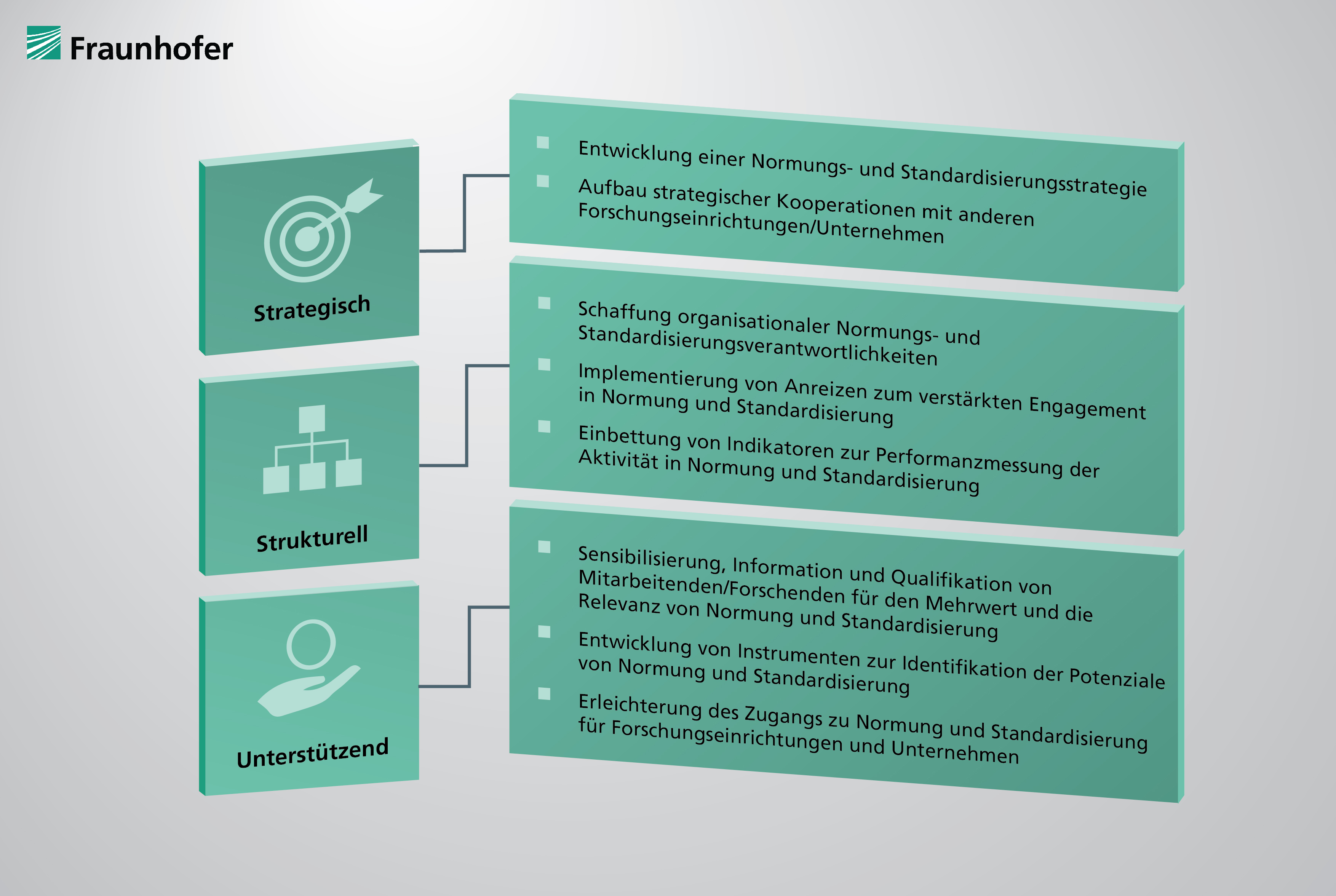The Relevance of Standardization for Knowledge and Technology Transfer
Fraunhofer Study: Making Better Use of the Potential of Norms and Standards
Norms and standards are an important catalyst for the scaling up of innovations. They define the milestones of technology and pave the way for innovative ideas to succeed on the market. Companies and research organizations can also benefit from them. But often this leverage for business, science and society is not yet sufficiently exploited. This is where a study conducted by the Fraunhofer-Gesellschaft comes in. Based on extensive research, interviews and analyses, it provides precise recommendations for action on how organizations can make the most of the benefits of norms and standards.

They are invisible in everyday life and yet indispensable. Standards and norms make decisive contributions to ensuring that technological innovations become successful products or services for the market. They also enable the system capability of technology and the development of compatible products. In medicine, transportation or digital communication, standards and norms define minimum requirements for quality and safety. They guarantee interoperability. This is not the only reason why they enjoy a high level of trust among the general public.
Nevertheless, many companies and research institutions are reluctant to participate in the underlying standardization processes or to join corresponding committees. The Fraunhofer-Gesellschaft's current study “The Relevance of Standardization for Knowledge and Technology Transfer” shows why this is the case and how it can be changed. The study was conducted by the Fraunhofer Institute for Systems and Innovation Research ISI in Karlsruhe together with the Fraunhofer Center for International Management and Knowledge Economy IMW in Leipzig. The authors of the study obtained their findings from extensive research as well as interviews with selected companies, research institutions, associations and standardization organizations. In addition to analyzing the current situation, the researchers have developed a set of practical recommendations for action.
Prof. Ralf Wehrspohn, Executive Vice President, Technology Marketing and Business Models at the Fraunhofer-Gesellschaft, emphasizes the importance of the topic for the systematic further development of technology transfer: “Standards and norms are a catalyst in the transformation of technologies and research results into useful products and are also becoming increasingly important internationally. There is enormous potential here for many companies and research institutions.”
In addition, standards and norms are a key driver of the international knowledge economy. They accelerate the spread of knowledge, know-how and innovations across the globe. The international aspect is also appreciated by the OECD. In 2018, the organization included standards and norms in its portfolio of innovation measurement indicators.
Why Companies Hold Back
The study highlights the reasons why organizations are reluctant to engage in standardization and standardization processes. “One main cause is a lack of standardization knowledge in organizations. Both companies and research institutions are not even aware of the enormous added value that participation offers,” explains Prof. Knut Blind from Fraunhofer ISI, who, together with Philipp Hermann from Fraunhofer IMW, was project manager for the study. In addition, this added value is often intangible and difficult to quantify, even though it contributes to the success of the company or research organization. Many also fear that their own participation in the community contribution is difficult for outsiders to recognize.
Organizations surveyed in the study that are actively involved in standardization processes or in standardization bodies, however, repeatedly report positive experiences. “For experts from business and science, collaboration with experts from other organizations is extremely exciting. Companies, for example, get in touch with future business partners or customers here,” says Philipp Herrmann from Fraunhofer IMW. Moreover, companies can use their participation in a corresponding working group to adapt the specifications of the respective standard to their business interests and the technologies already available in the company. Research organizations also benefit. “We researchers experience time and again that our findings are only realized as a product once we have succeeded in defining them as a standard,” explains Blind.
The commitment to norms and standards does not promise quick returns; it is strategically designed. But it is definitely worthwhile for all involved. Wehrspohn also points to positive effects for society as a whole: “In the challenging times of climate change, the Corona pandemic and the debate about fake news, we are more dependent than ever on the findings of science. Establishing standards and norms creates working products that are socially accepted. And nothing proves the seriousness of research better than functioning products with social acceptance.”
The Study's Recommendations for Action
Finally, the Fraunhofer study offers recommendations for action for research institutions and companies. One recommendation is to first develop a fundamental strategy for standardization. Equally important is the sensitization and qualification of employees and researchers for the importance of standardization. It would also make sense to establish processes for regularly reviewing in-house technologies for their suitability as standards and to designate responsibilities. In addition, the study recommends considering cooperation with other companies or research groups where appropriate.
Your contact persons at Fraunhofer IMW:
Philipp Herrmann
Project management and editorial team
Fraunhofer IMW
philipp.herrmann@imw.fraunhofer.de
Dirk Böttner-Langolf
Communication
Fraunhofer IMW
Phone +49 341 231039-250
dirk.boettner-langolf@imw.fraunhofer.de
